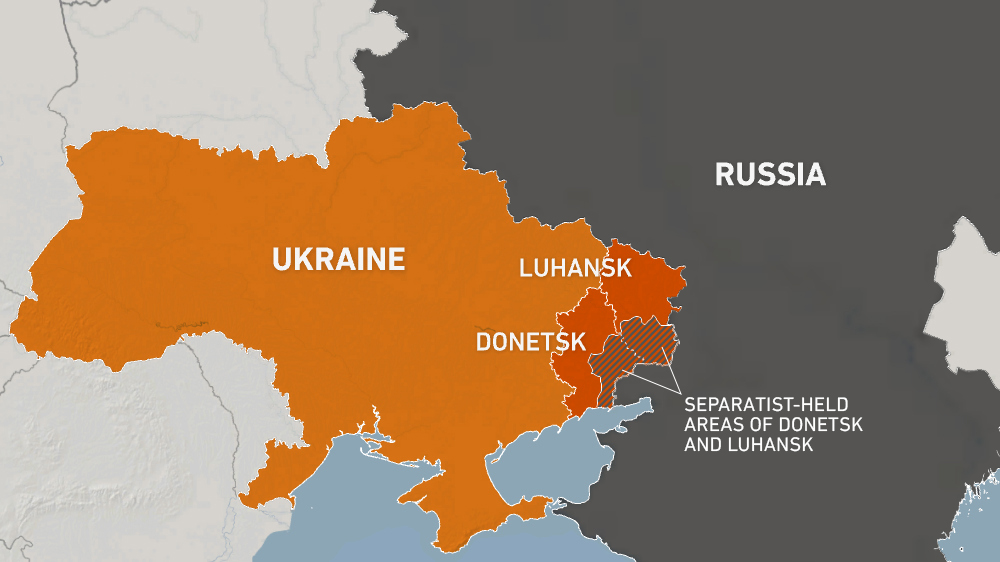
Ukraine has accused Russia of boosting supplies of weapons, ammunition and military equipment to separatist regions in Ukraine while actively recruiting mercenaries to fight in the ongoing conflict.
The claims by Kyiv’s military intelligence service on Friday came as United States Secretary of State Antony Blinken and Russian Foreign Minister Sergey Lavrov met in Geneva, the latest attempt at diplomacy aimed at easing fears of a Russian invasion.
The agency said Moscow “continues to increase the combat capabilities” of pro-Russian separatists and since the start of this month, has “secretly transferred by rail and road more than 7,000 tonnes of fuel, several tanks and self-propelled artillery units” to the regions.
It said Russia was also undertaking “active recruitment of mercenaries” who are being sent to separatist-controlled regions.
The neighbours have been locked in the separatist conflict in Ukraine’s eastern regions, particularly in Donetsk and Luhansk, since April 2014. The fighting began after mass protests prompted Ukraine’s then Moscow-friendly leader to flee to Russia.
Russia, in turn, annexed Ukraine’s Crimean Peninsula.
Kyiv says at least 14,000 people have been killed in eight years of violence, and along with its Western allies blames the bloodshed on Russian-sent fighters and weapons.
Meanwhile, legislators in Russia’s parliament on Friday put forward a bill that would ask President Vladimir Putin to recognise the independence of pro-Moscow separatist regions in Donetsk and Luhansk.

Lower house Speaker Vyacheslav Volodin said such a move, which is all but assured to enrage Ukraine and prompt Western condemnation, would be “a solution to provide for the security of our citizens and countrymen” in the two regions.
Fears of invasion
The latest machinations come as Ukrainian and Western concerns over a weeks-long build-up of 100,000 Russian soldiers along the Ukrainian border reach a fever pitch.
Last week, US and Ukrainian officials said “Russian influence actors” had already begun a “false flag operation” meant to “fabricate Ukrainian provocations” and “justify a Russian intervention”.
Moscow has denied planning an attack, but has said it could take unspecified military action if its demands are not met. The demands include a permanent prohibition on Ukrainian membership in NATO, which the US and its European allies have already rejected, and the removal of most US and allied military presence in Eastern Europe.
Washington and its allies have repeatedly promised “severe” consequences, including biting economic sanctions, if a Russian invasion goes ahead.
Before meeting Lavrov on Friday, Blinken met Ukrainian President Volodymyr Zelenskyy in Kyiv and top diplomats from Britain, France and Germany in Berlin, where he stressed the US unity with its allies.
That came after President Joe Biden, on Wednesday, drew widespread criticism, including from Zelenskyy, for saying retaliation for Russian aggression in Ukraine would depend on the details, while suggesting that a “minor incursion” would spark an internal “fight” between NATO allies on how to proceed.
Zelenskyy responded on Twitter: “We want to remind the great powers that there are no minor incursions and small nations. Just as there are no minor casualties and little grief from the loss of loved ones.”
Biden later clarified that “any assembled Russian units” moving across the Ukrainian border would be considered an “invasion”.
Speaking on Friday, Lavrov said it was “premature” to start talking about a summit between Presidents Biden and Putin, but that another meeting with Blinken in the near future was possible.
Lavrov called the talks “constructive and useful” and said Washington had agreed to provide a written response next week which would show “whether we are on the right path or not”.







